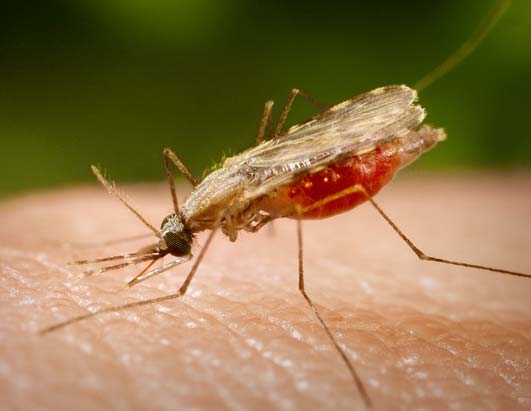The UK is to be hit by regular malaria outbreaks, fatal heatwaves and contaminated drinking water within five years because of global warming, the Government has warned the NHS.
Following a major consultation with climate change scientists, the Government is issuing official advice to hospitals, care homes and institutions for dealing with rising temperatures, increased flooding, gales and other major weather events.
It warns that there is a high likelihood of a major heatwave, leading to as many as 10,000 deaths, hitting the UK by 2012.
All institutions have been told they must come up with a comprehensive plan on how to deal with the issues resulting from climate change.
Hospitals are also warned to prepare for outbreaks of malaria and tick-born viruses, as well as increased levels of skin cancer and deaths from asthma and other breathing conditions.
A spokesman for the Health Protection Agency said: “Our work is based on what is likely to happen if we do nothing to prevent it – and it could well be that we see an increase in diseases such as malaria.
http://www.telegraph.co.uk/earth/earthnews/3325067/Malaria-warning-as-UK-becomes-warmer.html



During the 18th and 19th century Malaria epidemics have been reported in….Siberia.
There is no connection between Malaria and temperatures.
DDT what a legend. That’s all I can say, and suffer to the countries that can’t use it now to fix the problem, because idiots in USA banned it.
“There is no connection between Malaria and temperatures.”
Perhaps on your planet but not this one, here is just some of the supporting ‘Real’ Science;
http://www.sciencedirect.com/science?_ob=ArticleURL&_udi=B6T1B-49KCFF2-4NT&_user=10&_coverDate=03%2F19%2F1994&_rdoc=1&_fmt=high&_orig=search&_origin=search&_sort=d&_docanchor=&view=c&_searchStrId=1514127560&_rerunOrigin=scholar.google&_acct=C000050221&_version=1&_urlVersion=0&_userid=10&md5=850876a1f5f7301c9f6d8f52754d27f3&searchtype=a
http://onlinelibrary.wiley.com/doi/10.1046/j.1365-3156.2000.00551.x/full
http://www.pnas.org/content/103/15/5829.abstract
http://whqlibdoc.who.int/bulletin/1998/Vol76-No1/bulletin_1998_76%281%29_33-45.pdf
http://www.pnas.org/content/103/15/5635.extract
Some common sense from the conclusions of one of the papers you quote: http://whqlibdoc.who.int/bulletin/1998/Vol76-No1/bulletin_1998_76(1)_33-45.pdf
“It is difficult to be confident that epidemics are becoming more common in this region since comprehensive and reliable data is not available.
…
It is not possible to prove that one factor [eg. temperature] has resulted in this increase since correlation does not prove causality. The risks of [malaria] are not only dependent on environmental factors but also upon the vulnerability of highland communities and the capabilities of local health services.
…
One of the major reasons for increases in malaria incidence in recent years has been a decline in the control and treatment of the disease.
…
Outbreaks can occur in years that have a similar climate to other years when epidemics did not occur.”
Clearly the best way for these people to combat malaria would be to take sensible precautions – fit nets on their doors and windows. Sleep under mosquito nets and spray the inside of their houses with DDT. It’s ridiculous to treat these people as helpless victims of temperature variations – whether natural or man-made.
Some problems with the other papers:
The first paper looks at one health centre in Rwanda over a 3yr period up to 1987 and claims the increase in Malaria that year was attributable to the higher temps and rainfall. Seems to me that many other factors could be responsible. Rwanda has been ravaged by civil war – particularly in the 80’s. See http://en.wikipedia.org/wiki/Rwandan_Patriotic_Front
Was the health centre near any refugee camps? Did these see an influx of refugees that year and a consequent increase in poverty and insanitary conditions?
Your second paper looks at 9 villages in the south west Uganda from 1997-98. They find an apparent correlation with temperature but many confounding factors are at play – not least they note that “Factors such as .. use of agricultural insecticides were not measured” Duh!
Anyway – all these papers relate to poor people living in huts in Africa. While I accept the UK standard of living may be slightly lower than the US, trust me, there’s no chance of malaria breaking out in our English mud huts.
I would not be so certain. If money is not spent on vector control and carriers of malaria are present [they are], then an outbreak of malaria is quite possible.
All it would take is a mild breakdown in some townships’ vector control program.
Just to be clear – we don’t have mud huts, ‘townships’ or ‘vector control’ in the UK. The only malaria cases are ones that tourists catch overseas.
In the unlikely event of an insect penetrating the defenses of my house – it will soon be splatted, squished or gassed by one of the occupants.
Agreed the article is pure alarmist bollo, and Lazurus’ African papers certainly don’t support the assertion that Malaria could be a threat to the UK – nor do they even support the assertion that warming is responsible for recent outbreaks in Africa.
You are being obtuse, dood. Mosquitoes don’t give a damn about word play. LOL Your public health service does control insect vectors in old blighty, regardless of it’s name de jour.
http://www.malariajournal.com/content/9/1/70
this is about Culex but there is no reason that Anopheles could not be present as well. Consider that when you use the tube and some malaria infected bum is hanging about.
http://www.gene.ch/gentech/1998/Jul-Sep/msg00188.html
Considering that almost all of England, Wales. and Ireland are ALREADY HOME RANGE to known Malaria vectors Anopheles atroparvus and messeae, global cooling or global nothing as well as global warming could cause a Malaria outbreak too. What an idiotic article.
http://upload.wikimedia.org/wikipedia/commons/a/ad/Anopheles-range-map.png